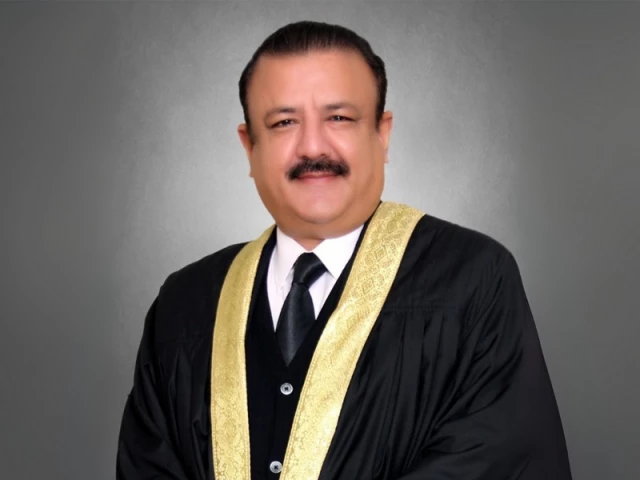The High Court of the Sindh (SHC) suspended the decision of the University of Karachi to cancel the diploma of the judge of the High Court of Islamabad (IHC) Tariq Mehmood Jahangiri.
A bench of two members led by judge Muhammad Iqbal Kalhoro heard the petition against the cancellation of the degree. Sindh lawyer Jawad Dero, Professor Registraire of Ku Imran Siddiqui, and other officials were present at the hearing.
The clerk informed the court according to which the university had received a “only two days earlier” notice and asked for the time to submit a response.
The petitioner’s lawyer, Barrister Salahuddin, asked for more time on the bench to respond while seeking the cancellation of the order of the university in the meantime.
“How long do you need?” If measures are taken against the petitioner during this period, who will compensate for the loss? If the order is later reversed, who will be responsible? The bench asked the registrar.
Read: Judicial independence price: Jahangiri
Siddiqui replied that he had been newly appointed registraire and was not aware of the history of the case.
This has upset the bench further. “If you are in court, you must provide answers. The action may have been motivated by personal interest. Questions are raised above his diploma. Even if someone deposits a petition 30 to 35 years later, the affected person must be heard. We do not say that the action cannot be taken, but the honor of a person cannot be brought into play. ”
Judge Kalhoro added that the judicial decisions adopted without hearing both parties were undergoing little weight. “Ex-play judgments are not considered good judgments.”
The bench suspended Ku’s notification and prevented the University from taking new measures according to the union’s recommendations and unjust means committee. The next hearing is scheduled for October 24.
“Fictive degree”
Ku had declared the “fictitious” Jahangiri LLB diploma after his unjust committee of means concluded that he had never been registered with Islamia Law College and that he had had a professional fault during his LLB exams in the 1980s.
The Ku union approved the conclusions, which later became the basis of a complaint currently pending before the Supreme Judicial Council (SJC).
‘Mala fide intention’
Judge Jahangiri maintains that the cancellation was “illegal” and “Mala Fide”, saying that it violated the principles of natural justice because it was not advised before the decision. He also argues that this decision is equivalent to political victimization, by linking it to the previous cases to affirming him judicial independence.
Jahangiri referred to a letter he signed in March 2024 against the surveillance of judges and his work as a judge in an electoral court, which upset the candidates of the party in power by his decisions, as examples of these cases.
Find out more: SC dose the reservoir of judge IHC Jahangiri
Earlier, on September 16, a divisional bench of the IHC, led by chief judge Sardar Muhammad Sarfraz Dogar, prevented judge Jahangiri from carrying out legal work because he took procedures on a petition quo Garando calling into question the validity of his LLB diploma.
Three days later, on September 19, judge Jahangiri, as well as four other IHC judges, filed separate constitutional requests before the Supreme Court, aimed at canceling the order for non-contestation of the IHC.
On September 25, Ku officially canceled his LLB diploma, citing the previous decision of the union.
Read also: Jahangiri’s petitions of the IHC SC in a diploma file
Judge Jahangiri then approached SHC to contest the maintenance of the procedure and stress that it had not been officially put in place or in opinion.
During the hearing, his lawyer organized a disengagement at the embarrassment of the SHC bench. “Such conduct is very obsolete,” observed the bench, warning that he could constitute an outrage of the court.
On September 30, a constitutional bench of five members of the Supreme Court, led by Judge Aminuddin Khan, suspended the IHC order who had prohibited Jahangiri from judicial work.
The high -level court stressed that a judge could not be prevented from performing functions through a provisional order and noted that only the Supreme Judicial Council (SJC) has the power to act against an in -office judge.
Judge Jahangiri’s judicial duties were restored but limited to the unique and divisional benches.
More recently, on October 3, judge Jahangiri filed a request before the Supreme Court against the SHC decision which rejected his plea to become a party in the false file.
The petition argued that the SHC had led an ex-party judgment without hearing the injured party and appointed 10 institutions, including Ku and the Sindh Higher Education Commission, as respondents.
The main lawyer Faisal Siddiqui asked how the SHC could reign over maintainability without first hearing the injured party, while the lawyer of Jahangiri, providing Malik, argued that only the SJC had the constitutional power to take measures against a judge in office. Malik also stressed that the cancellation of a diploma after 34 years was “unprecedented”.
The APPX court is expected to examine the maintenance of petitions as well as the procedures adopted by KU and SHC. Lawyers claim that the result could have large -scale implications for judicial independence and the process of complaints against judges in office.




